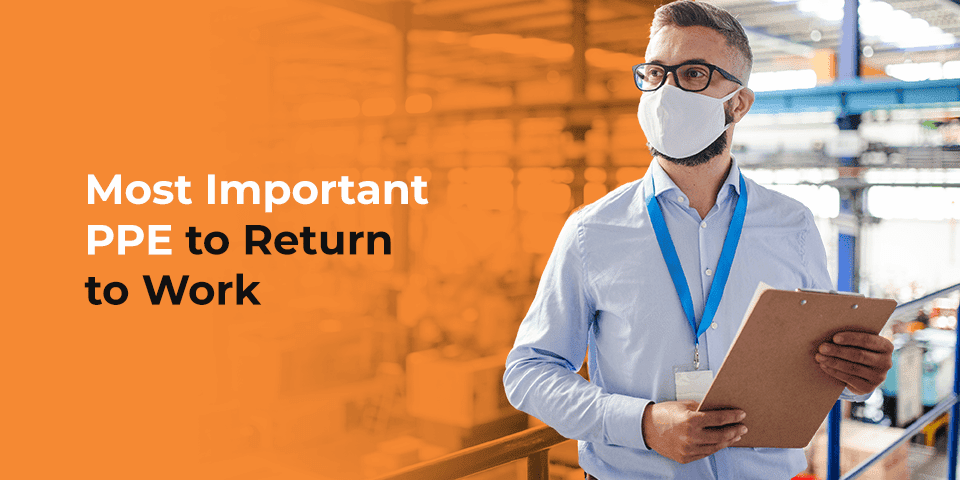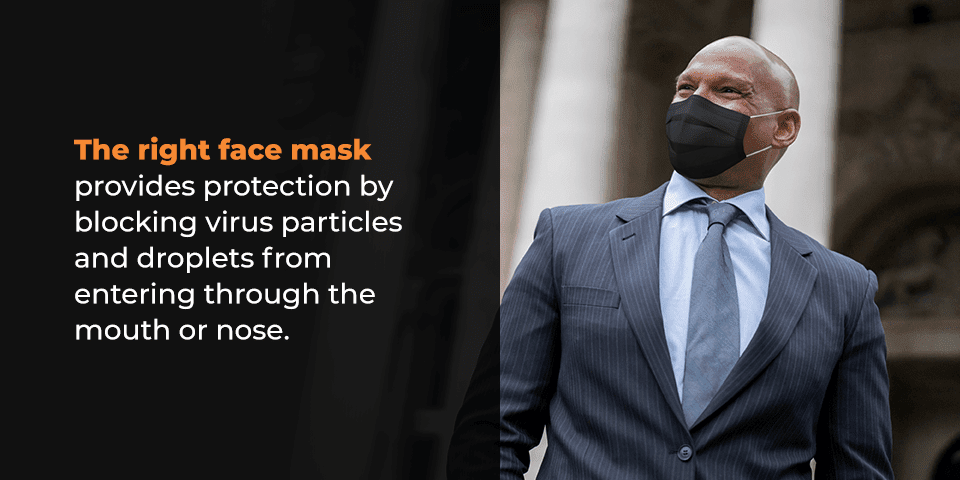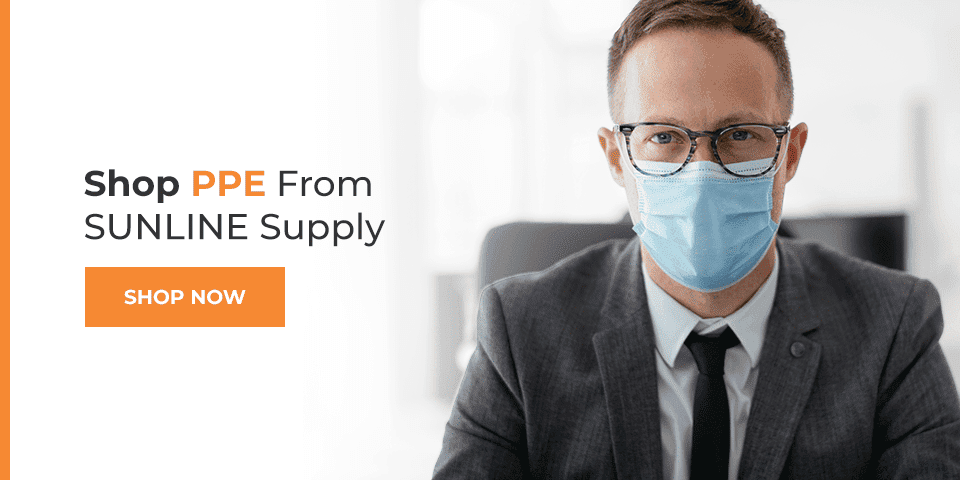
Most Important PPE to Return to Work
As people are returning to work amid COVID-19, it is now more crucial than ever to have the right types of personal protective equipment (PPE) available to keep employees safe. But what types of PPE are most important for employees to have when they return to work?
This article will break down what PPE rules employers should implement when their employees return to work and the different types of recommended PPE needed for the workplace.
What Guidelines Should Employers Implement?
Before returning employees completely back to the office, there are several guidelines employers should consider implementing. The CDC and OSHA have come up with a list of comprehensive guidelines organizations should follow in order to return to work. For employers, it is essential to understand these principles and the legal implications of violating them.
First, employers must implement strict hygiene practices. Below are some of the CDC guidelines regarding hygiene practices for the workplace:
- Employees should wash their hands regularly after using the bathroom and before eating.
- Employees should avoid touching their faces throughout the day.
- Employees should use tissues or cover when coughing or sneezing.
- Employers should provide cleaning supplies and disinfectants for employees to sanitize.
Additionally, employers should also ensure they take proper measures to maintain social distancing standards within the office. These actions include:
- Constructing barriers between employees working in close proximity.
- Using signs or other visuals to promote proper social distancing among employees.
- Providing remote work options for high-risk individuals whose duties do not force them to be on site.
All employers should develop a response plan for identifying and dealing with future COVID-19 outbreaks. The main purpose of a response plan is to ensure employees know what to expect if their co-workers test positive or get sick. An effective response plan should include:
- Training for employees on policies and procedures.
- Offering consistent communication and updates from managers.
- Implementing remote work options for employees.
- Providing employees with PPE.
Are Employers Obligated to Provide PPE to Employees Returning to Work?
Whether employers are required to provide their employees with PPE is answered in OSHA’s guidelines. In short, employers are obligated to provide a safe environment for all employees to perform their job. Therefore, under these guidelines, employees are expected to receive PPE upon returning to work. Additionally, employers must train employees on the proper use of PPE to reduce the risk of exposure to COVID-19.
While employers must provide protective equipment to their employees, the type of PPE varies depending on the level of workplace risk. In other words, employees who work in high-exposure workplaces, such as in healthcare facilities, require the most amount of protection. Conversely, those with little face-to-face contact with the general public or other co-workers require the least protection. Moreover, PPE usage varies depending on different local and state regulations.
With several standards in place to keep employees safe in the workplace, it is critical for businesses to keep up-to-date and ensure they are following these orders. For employers, PPE is one of the top priorities to consider when planning to get employees back to work. Therefore, it is wise to invest in the right kind of PPE needed to keep employees safe.

Recommended PPE Needed to Return to Work
Employers should first conduct a hazard assessment to determine what type of PPE is best to get back to work. This assessment will identify the level of risk associated with the general nature of their industry and the level of exposure employees will have to COVID-19. By analyzing the specific level of risk involved with their workplace, employers can determine the most crucial PPE needed to return employees to work.
While there are different forms of personal protective equipment, there are two main types of PPE recommended for employers to supply upon returning to work. This PPE includes protective face masks and gloves.
The right face mask provides protection by blocking virus particles and droplets from entering through the mouth or nose. The recommended face mask varies based on the level of exposure involved in the workplace. Below are the most common PPE face masks:
- 3-Ply face masks: One-time, disposable face mask with three layers of protection
- KN95 masks: Disposable face mask that offers daily protection of nose, mouth and jaw
- N95 masks: Reduces the risk of small airborne particles, making them effective in high-risk workplaces such as healthcare facilities
Using gloves prevents workers from contamination when in contact with infected surfaces, materials or equipment. Some of the common types of PPE gloves include:
- Nitrile gloves
- Vinyl gloves
- Latex gloves
Can Employees Take Action When Employers Do Not Offer PPE?
In the situation where an employer does not provide PPE upon returning to work, employees have the ability to take action. If employees feel unsafe, they can refuse to come to work. However, that’s only applicable in certain circumstances:
- An employer refuses to address the safety concern after an employee brings it to their attention.
- An employee feels impending danger to themself.
- The nature of work involves a high risk of exposure and an adequate level of PPE is not provided.
If an employer fails to abide by OSHA’s COVID-19 guidelines, employees are able to report their concerns directly to OSHA. Therefore, it is vital for employers to understand the rights their employees have regarding PPE and the implications of violating those guidelines.
Other Measures to Safely Return to Work
In addition to the PPE that employers need to return to work, other non-PPE measures are important for employers to consider:
- Cleaning protocols: Employers should implement regular cleaning protocols when returning to the workplace. These protocols can include sanitizing and deep cleaning common areas, bathrooms, desks and other surfaces that may cause employee exposure.
- Flexible sick leave: Employees should also have flexibility when it comes to sick leave. This way, employees can take time off in an emergency situation or if they need to care for a sick family member.
- Temperature checking: Employers should implement regular temperature checks to help identify early symptoms of COVID-19 before others are exposed. When conducting temperature checks, it is important to abide by all laws regarding employee confidentiality.
- Staggered scheduling: The option to stagger employees’ work schedules is another measure employers can use when returning to work. This is an effective way to reduce the number of employees who may come in contact with each other throughout the workday.
- Capacity limits: Similar to staggering schedules, employers can implement capacity limits on the number of employees in the workplace. One point to think about is making sure those who are not working can do their job from a remote setting.

Shop PPE From SUNLINE Supply
At SUNLINE Supply, we make it easy to buy high-quality PPE online and offer fast shipping on all orders through our established supply chain. Thanks to our rapid turnaround times, we can provide you with your bulk order in a matter of weeks. To shop PPE, contact us to request a quote.

